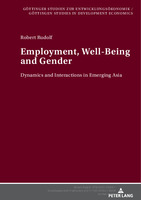Employment, Well-Being and Gender
Dynamics and Interactions in Emerging Asia
Abstract
This book examines welfare effects of gender-related inequalities in Korean households and labor markets. It uses subjective well-being data to show that reductions of excessive levels of working hours did improve family well-being in the past decade. Moreover, benefits from major life events like marriage can differ greatly by sex if traditional gender roles dominate and women contribute much less than men to household earnings. Furthermore, the study examines dynamics in rural East Asian economies and their impact on individual welfare outcomes. Both land redistribution and productivity-enhancing reforms are found to have been highly beneficial for Korean development. The Indonesian case study demonstrates the importance of cash-crop decisions and the growing non-farm sector for rural development.
Keywords
Agricultural Productivity; Asia; Being; Dynamics; Emerging; Employment; Gender; Income Dynamics; Interactions; Post-Crisis Indonesia; Rudolf; Rural Development; South Korea; Traditional Gender Roles; WellDOI
10.3726/b13874ISBN
9783631753521OCN
1082956948Publisher website
https://www.peterlang.com/Publication date and place
Bern, 2018Series
Goettinger Studien zur Entwicklungsoekonomik / Goettingen Studies in Development Economics, 35Classification
Gender studies: women and girls
Population and demography
Sociology: family and relationships
Monetary economics


 Download
Download